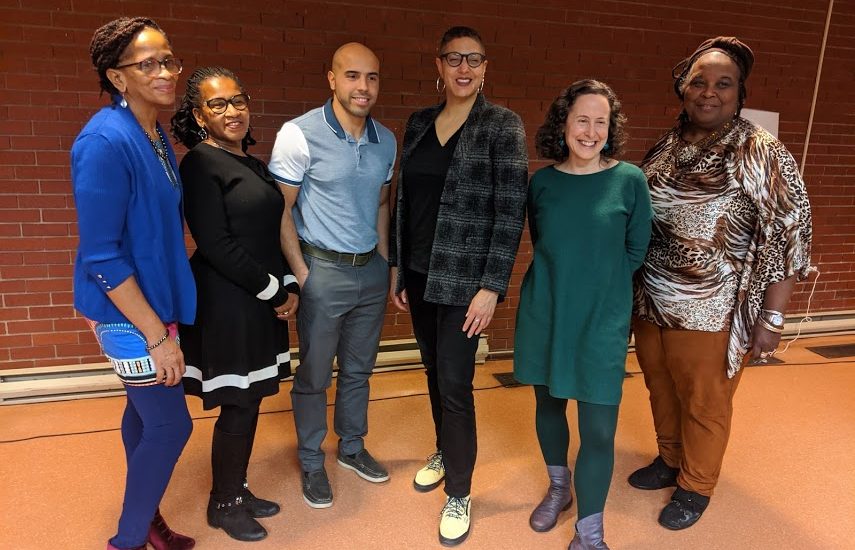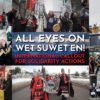
KJIPUKTUK (Halifax) – A thought provoking community meeting at the Halifax North End library last evening explored the notion of reparations as it pertains to Nova Scotia’s Black communities.
A panel was asked to think aloud about what the case for reparations in Nova Scotia could look like, what demands should be considered, and how to make reparations a part of all conversations between African Nova Scotian communities and government.
“At its very simplest, reparation means to make amends, offering atonement, we’re giving satisfaction for a wrong or an injury. Reparation is about repairing or restoring, it is a formal acknowledgement and apology, and a recognition that the injury continues in the present,” said moderator Rachel Zellars, a lawyer and assistant professor in the Social Justice and Community Studies Department at Saint Mary’s University.
“The demand for compensation is first for our suffering and disenfranchisement under the long history of slavery. And secondly, the historical wrongdoings that have followed, and that mark us in our lives and we continue very much in the present,” Zellars said.
Compensation could be in the form of money, through political representation, and through grants, scholarships, quotas, etc., she said.
Speaking about Nova Scotia, Zellars suggested that environmental racism, including the denial of land ownership, and the treatment of Black children both should be considered prime areas to build a case for reparations.
“Black children appear everywhere throughout the historical records as non-children, the old idea of impossible innocence, or in its modern usage culpability, helps us understand the lack of sentience historically ascribed to Black children,” said Zellars, quoting heartless slave ads from the Maritimes to illustrate her point.
See also: Book review: North to Bondage: Loyalist slavery in the Maritimes
The panel conversation, with law student Marcus Marsman, Sylvia Parris-Drummond, CEO of the Delmore Buddy Daye Learning Centre, and tireless activist Lynn Jones, tackled a variety of questions.
Jones, who, together with the Nova Scotia chapter of the Global African Congress, has championed the case for reparations in Nova Scotia, explained why she believes it is so crucial that Nova Scotia play a lead role in these discussions in Canada.
“I can’t help it, but I have a passion for Nova Scotia’s case for reparations. As an African people we first arrived in Nova Scotia, it only stands to reason that we provide leadership,” Jones said.
Parris-Drummond emphasized that decisions about reparations must be rooted in personal experiences and made at a community level.
“The importance of reparations is about being able to say for ourselves, and our community selves, what needs to be redressed and how it needs to be redressed, and only being satisfied when our collective experience guides the actions moving forward. The discussion of reparations and the application of reparations need to be always centered from us,” she said.
Carolann Wright-Parks spoke about the efforts by the historic Black community of Beechville to get redress after being subjected to centuries of erasure through racist planning decisions and plain old neglect by developers and white decision makers. A sign recognizing the historic Black presence, a restoration of its old community boundaries, these things may not sound like much, but for the community they are vitally important, Wright said.
“The reparations argument is really critical, reparations should be the cornerstone of any conversation with HRM planners,” Wright-Parks said. “It is not a pipe dream. It really is not crazy. It is essential to any conversation that we have as a community.”
See also: Lucasville: A 200-year old African Nova Scotian community fighting for survival
Delvina Bernard, of Four the Moment fame, and now working towards a reparations-related PhD made some observations about reparations and social change.
“What I think we ought to be adding to this debate is a guiding theoretical framework that looks at reparations as a model for social change. A lot of us see it as a model for compensation. I see it as a model for moving the needle in terms of how we live our lives as humans,” Bernard said.
“Otherwise, we might just be looking to be compensated. And part of that is that we are really asking just to be included in the same capitalist economy that put us in the situation that we’re in in the first place,” she said.
Note that on Friday, February 29, a full day event focusing on reparations will be happening at the North Branch Library in Halifax, from 10am to 4pm. Details to follow.
See also: Slavery is a crime against humanity, and there will be no impunity, Halifax audience told
With a special thanks to our generous donors who make publication of the Nova Scotia Advocate possible.
Subscribe to the Nova Scotia Advocate weekly digest and never miss an article again. It’s free!



